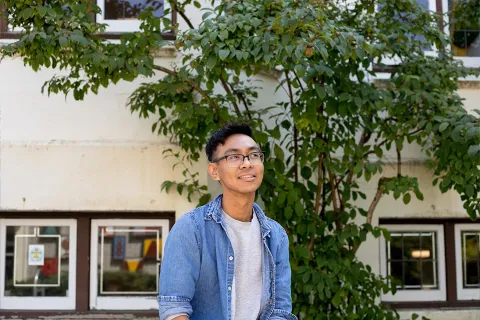"Let the needs of the community direct what you learn in your degree. They don’t have the same access to academia that you do, and it will help you communicate to a general audience."

William Canero
- Degree:
- Master of Community and Regional Planning
- Grad year: 2022
- Program:
William currently serves as a Board of Director for the Kathara Pilipino Indigenous Arts Collective Society and the South East Asian Heritage Society. During his time at UBC, William served as Councillor for the Graduate Student Society, the Planning Students Association, and the Planning Equity Coalition. William has had the privilege of facilitating consultations with the Pilipinx community, lead non-profits through strategic and long-term planning, and has recently worked with Burnaby’s Planning Department on ethnic business and farmer protections, arts and culture within Official Community Plans, and Indigenous co-management research. He has since moved on to start his own consulting firm, Malaya Planning and Engagement, which works with non-profits around planning issues within their local communities.
Why did you choose to go into your field of study at UBC?
I did my bachelor’s degree in political science at UBC where the issues of IBPOC communities were at the forefront of my mind and consistently came up time and time again as interrelated. At the time, I had the hope of completing my degree and working to improve public policy, yet a course with Su-Jan Yeo pulled me away from that trajectory close to the end of my bachelor's degree. Su-Jan’s course, PLAN425: Urban Issues and Concepts, articulated everything I had come to identify as issues in public policy and was the driving force to apply for my master’s degree in Community and Regional Planning. While I had an interest in learning more, my specialization within the field of planning wasn’t entirely thought out. Justice, Equity, and Inclusion appear in various facets of urban planning, and I wanted to learn more about what needs my community had as someone who was raised in Metro Vancouver and is heavily involved with Southeast Asian Arts and Culture. Afterwards, I reached out to Nora Angeles, a professor teaching at SCARP and GRSJ and invited her to speak at my non-profit’s AGM. Nora is prominent in my Filipino community and after learning of my interest in applying to SCARP, immediately scolded me for not reaching out sooner in the nurturing tone you often hear from mentors and leaders in the community. I learned of opportunities to work closely together, and the rest is history. Without meeting both of these capable and knowledgeable professors my life trajectory would have been very different, and I thank both of them immensely for their passion and mentorship.
What has made your time at UBC memorable?
While working with Nora Angeles for the National Pilipino Canadian Cultural Centre, I was pulled into a local divisive issue around the potential displacement of Filipino small businesses on Joyce St. A rezoning application at 5163-5187 Joyce St, threatened the community’s access to food and culture and was the epicentre of growing qualms of the community around a lack of:
1) affordable housing;
2) arts and cultural space;
3) ethnic food; and
4) consultation specific to the Filipino Community.
The town hall that was organized by the community garnered hundreds of attendees from the local community, and a new organization was created, working with Collingwood Neighbourhood House that consisted of various representatives across non-profit organizations and community members that were concerned for the site and wanted more say in the planning of Joyce St. The new local imagination of the Filipino community was one I hadn’t anticipated, and I continue to build on this work.
You can’t do community work without community.
What advice would you give a student entering your degree program?
Get involved with the local community, you will find opportunities to develop and apply your knowledge.
What are your future plans to make a difference in our world?
Since completing my degree, I have started a job as the Systems Change Coordinator at Collingwood Neighbourhood House and have started a planning firm helping non-profits with planning and engagement work. This work aims to empower communities to plan on their own. I believe planning is not reserved for those with the means or the tools. I instead, work within communities and provide knowledge, research, and expertise so that local equity-seeking communities can be better prepared for the evolving nature of injustice. Non-profits in our community have direct mandates to help the public, and I am committed to seeing the visions they have for themselves.
I work within communities and provide knowledge, research, and expertise so that local equity-seeking communities can be better prepared for the evolving nature of injustice.
How did your studies in the Faculty of Applied Science prepare you for the future of work?
I had the opportunity to meet a variety of professionals through my program which encouraged me to build my own firm and start my practice. Opportunities arise as my involvement with the community intensifies and I see my firm growing as I continue. I hope that one day it will be my full-time job, but I would not have dreamed of such without first meeting those already in the field through my program.


